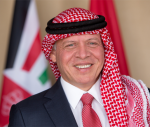You are here
IWD: Taking stock of women’s participation in agriculture sector
Mar 08,2022 - Last updated at Mar 08,2022
On International Women’s Day, my staff and I took a moment to reflect on our efforts towards gender equality in Jordan. Looking back on my first six months as Dutch ambassador, my exchanges with Jordanian women of all walks of life have inspired me. In particular in the agricultural sector I have encountered women entrepreneurship, strong views and perseverance.
Even though both men and women contribute to this sector, it remains a sector predominantly led by men. The informal nature of the agriculture sector makes it difficult to estimate the exact number of all workers engaged, let alone to estimate figures on gender, age and nationality. According to a 2020 International Labour Organisation (ILO) labour force survey, the proportion of female workers employed informally in agriculture was estimated at 95.2 per cent.
The agriculture sector in Jordan contributes approximately 4 per cent to GDP. The World Bank estimates that the sector has a growth potential of contributing 8 per cent to GDP. Jordan’s agricultural has a potential to increase well above $1 billion, or 13 per cent of total exports, while potentially doubling the number of formal jobs for women. There is no doubt in my mind that female leadership and entrepreneurship in agriculture is crucial as a key engine for growth and poverty reduction.
In a typically informal sector, working conditions are often poor. Lacking access to comprehensive social protection systems is a major obstacle to attract women to work in the agricultural sector. They also have to deal with gender-specific obstacles as well. Thus, the absence of a formal employment position not only exposes women to potentially harmful working conditions, it also makes accessing social protection, such as social security and health insurance, virtually impossible.
The Netherlands has become a substantial donor in Jordan’s agricultural sector, and the embassy partners closely with the government, (I)NGOs and the private sector to advance technical support for water-efficient agriculture. Another key focus of our programme is increasing female participation while ensuring decent work conditions and access to social protection at the farm level across Jordan. We are also working towards enhancing workers’ representation and increased awareness of their rights. This is particularly important for women.
Through a Netherlands’ funded programme called PROSPECTS, ILO, in partnership with the General Federation of Jordanian Trade Unions (GFJTU), has mobilised workers management committees at the farm level, three of which are dedicated to female agriculture workers. Through the committees, workers learn about their rights, and they serve as channel of communication with their employers.
In addition, through this PROSPECTS partnership, the ILO has been able to support farms across Jordan. Many of those farms have taken concrete and measurable steps to improve working conditions, including entering into standardised and written employment contracts, providing information on occupational safety and health, as well as providing improved accommodations for those living on farms.
Furthermore, consultations were held to better understand what attracts youth and women to the sector. Technology, ICT solutions and innovation were identified as crucial entry points for their engagement. As a result, two vocational programmes were initiated to support young farmers and cooperatives with infrastructure and equipment, as well as technical and vocational education and training that is focused on new pre- and post-harvest techniques.
In our view, agriculture is a sector that offers high quality work and business opportunities, certainly also for young high potential women. My informative meetings with young and inspiring women, such as Zeina Fakhreddin, of Mujeb Organic Farms and Rawabi Al Qudah, of Florafarm, gave proof that they brought new energy, innovation, entrepreneurship and passion to the sector.
This strengthens The Netherlands’ resolve to remain committed as a partner of the agricultural sector of Jordan and to continue to work with local partners to advance decent work conditions for increased working opportunities for women in this vital sector.
Harry Verweij is ambassador of the Kingdom of The Netherlands to Jordan













